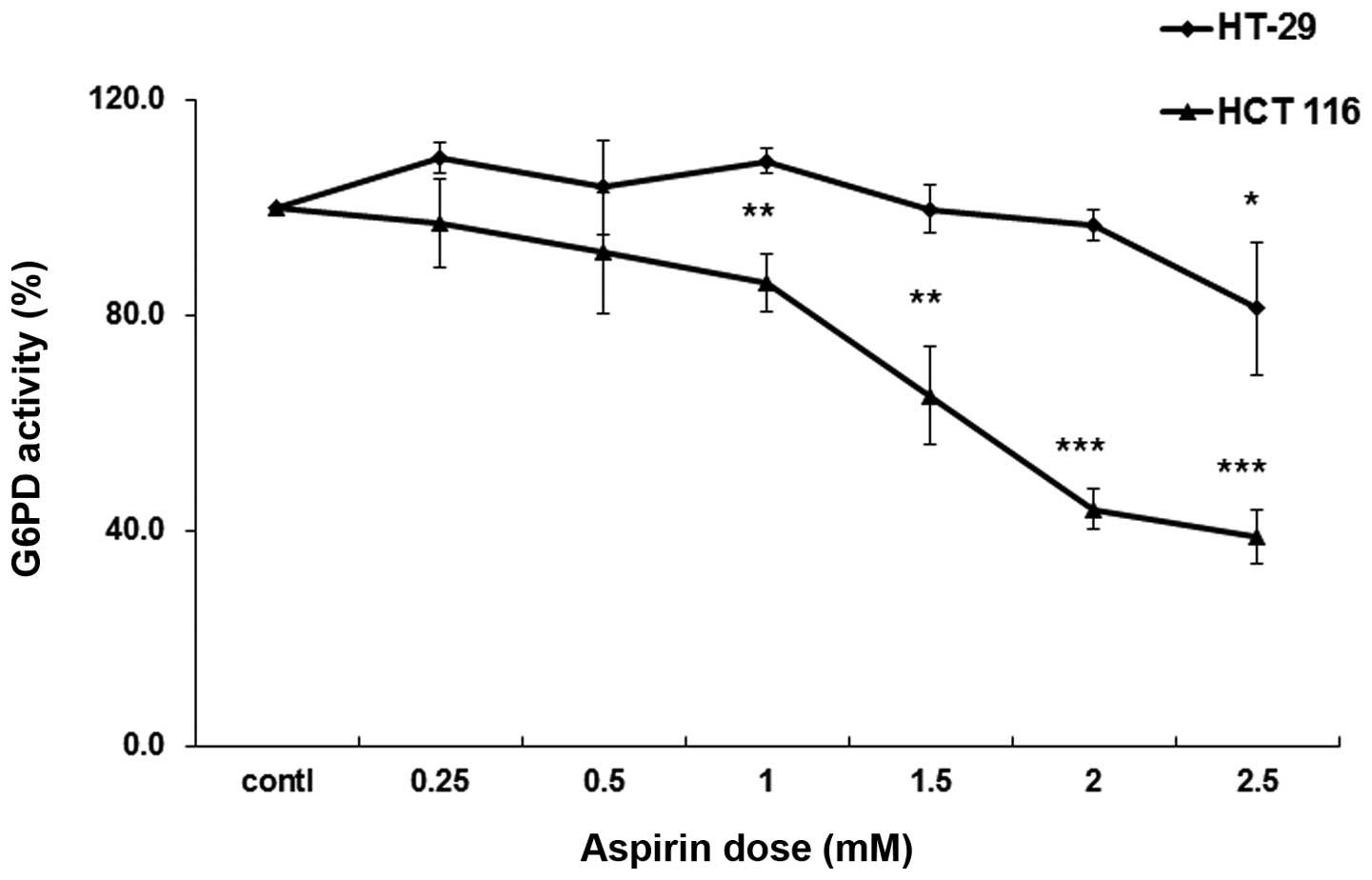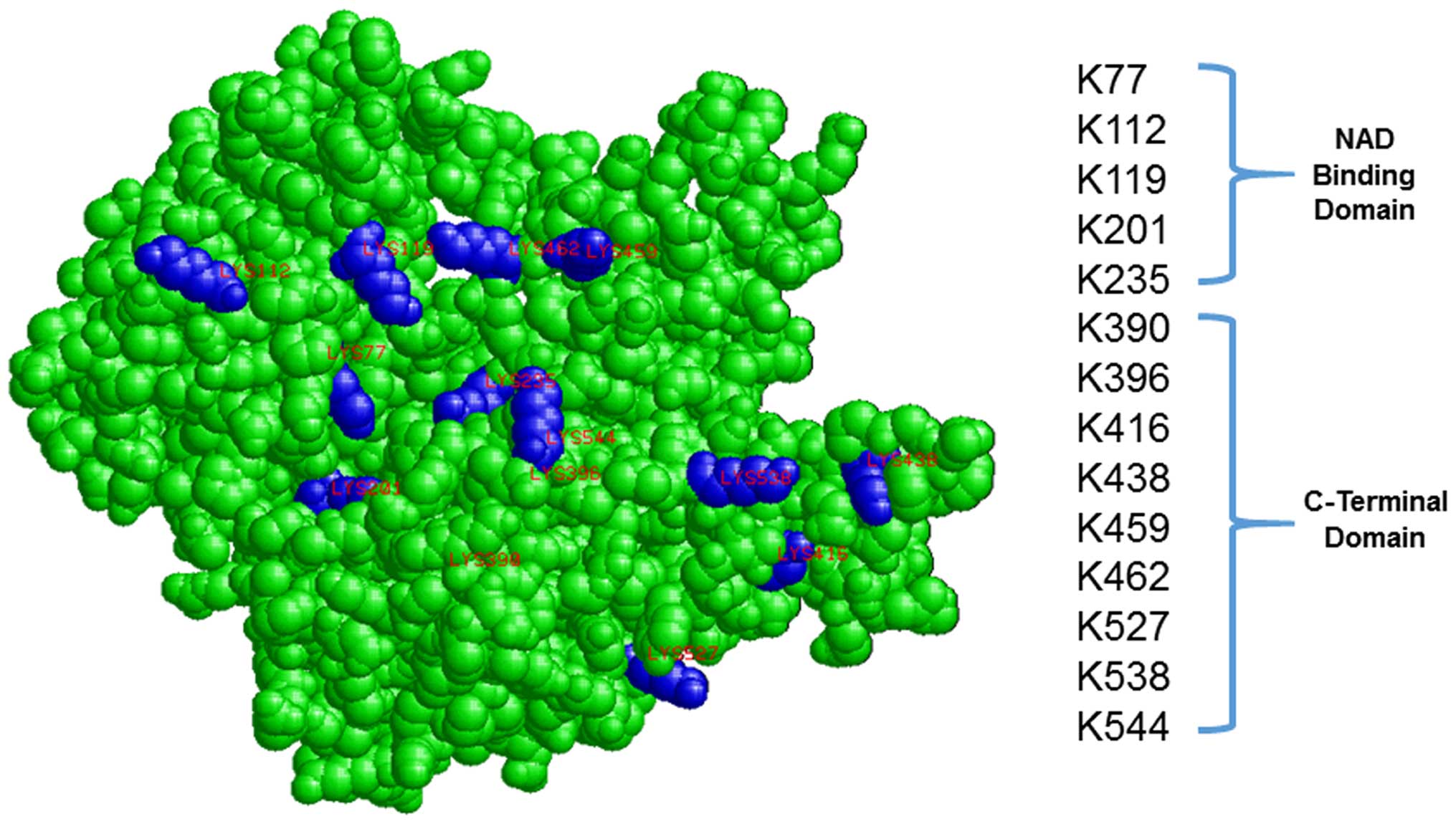|
1
|
Kaiser J: Will an aspirin a day keep
cancer away? Science. 337:1471–1473. 2012. View Article : Google Scholar : PubMed/NCBI
|
|
2
|
Thun MJ, Jacobs EJ and Patrono C: The role
of aspirin in cancer prevention. Nat Rev Clin Oncol. 9:259–267.
2012. View Article : Google Scholar : PubMed/NCBI
|
|
3
|
Chan AT, Arber N, Burn J, Chia WK, Elwood
P, Hull MA, Logan RF, Rothwell PM, Schrör K and Baron JA: Aspirin
in the chemoprevention of colorectal neoplasia: An overview. Cancer
Prev Res (Phila). 5:164–178. 2012. View Article : Google Scholar
|
|
4
|
Rothwell PM, Price JF, Fowkes FG,
Zanchetti A, Roncaglioni MC, Tognoni G, Lee R, Belch JF, Wilson M,
Mehta Z and Meade TW: Short-term effects of daily aspirin on cancer
incidence, mortality, and non-vascular death: Analysis of the time
course of risks and benefits in 51 randomised controlled trials.
Lancet. 379:1602–1612. 2012. View Article : Google Scholar : PubMed/NCBI
|
|
5
|
Ferrández A, Piazuelo E and Castells A:
Aspirin and the prevention of colorectal cancer. Best Pract Res
Clin Gastroenterol. 26:185–195. 2012. View Article : Google Scholar : PubMed/NCBI
|
|
6
|
Alfonso L, Ai G, Spitale RC and Bhat GJ:
Molecular targets of aspirin and cancer prevention. Br J Cancer.
111:61–67. 2014. View Article : Google Scholar : PubMed/NCBI
|
|
7
|
Dovizio M, Bruno A, Tacconelli S and
Patrignani P: Mode of action of aspirin as a chemopreventive agent.
Recent Results Cancer Res. 191:39–65. 2013. View Article : Google Scholar
|
|
8
|
Kopp E and Ghosh S: Inhibition of NF-kappa
B by sodium salicylate and aspirin. Science. 265:956–959. 1994.
View Article : Google Scholar : PubMed/NCBI
|
|
9
|
Hawley SA, Fullerton MD, Ross FA,
Schertzer JD, Chevtzoff C, Walker KJ, Peggie MW, Zibrova D, Green
KA, Mustard KJ, et al: The ancient drug salicylate directly
activates AMP-activated protein kinase. Science. 336:918–922. 2012.
View Article : Google Scholar : PubMed/NCBI
|
|
10
|
Choi HW, Tian M, Song F, Venereau E, Preti
A, Park SW, Hamilton K, Swapna GV, Manohar M, Moreau M, et al:
Aspirin's active metabolite salicylic acid targets high mobility
group Box 1 to modulate inflammatory responses. Mol Med.
21:526–535. 2015. View Article : Google Scholar : PubMed/NCBI
|
|
11
|
Dachineni R, Ai G, Kumar DR, Sadhu SS,
Tummala H and Bhat GJ: Cyclin A2 and CDK2 as novel targets of
aspirin and salicylic acid: A potential role in cancer prevention.
Mol Cancer Res. 14:241–252. 2016. View Article : Google Scholar
|
|
12
|
Alfonso LF, Srivenugopal KS and Bhat GJ:
Does aspirin acetylate multiple cellular proteins? (Review). Mol
Med Rep. 2:533–537. 2009.PubMed/NCBI
|
|
13
|
Marimuthu S, Chivukula RS, Alfonso LF,
Moridani M, Hagen FK and Bhat GJ: Aspirin acetylates multiple
cellular proteins in HCT-116 colon cancer cells: Identification of
novel targets. Int J Oncol. 39:1273–1283. 2011.PubMed/NCBI
|
|
14
|
Bateman LA, Zaro BW, Miller SM and Pratt
MR: An alkyne-aspirin chemical reporter for the detection of
aspirin-dependent protein modification in living cells. J Am Chem
Soc. 135:14568–14573. 2013. View Article : Google Scholar : PubMed/NCBI
|
|
15
|
Wang J, Zhang CJ, Zhang J, He Y, Lee YM,
Chen S, Lim TK, Ng S, Shen HM and Lin Q: Mapping sites of
aspirin-induced acetylations in live cells by quantitative
acid-cleavable activity-based protein profiling (QA-ABPP). Sci Rep.
5:78962015. View Article : Google Scholar : PubMed/NCBI
|
|
16
|
Alfonso LF, Srivenugopal KS, Arumugam TV,
Abbruscato TJ, Weidanz JA and Bhat GJ: Aspirin inhibits
camptothecin-induced p21CIP1 levels and potentiates apoptosis in
human breast cancer cells. Int J Oncol. 34:597–608. 2009.PubMed/NCBI
|
|
17
|
Ai G, Dachineni R, Kumar DR, Marimuthu S,
Alfonso LF and Bhat GJ: Aspirin acetylates wild type and mutant p53
in colon cancer cells: Identification of aspirin acetylated sites
on recombinant p53. Tumor Biol. Nov 23–2015.Epub ahead of
print.
|
|
18
|
Stanton RC: Glucose-6-phosphate
dehydrogenase, NADPH, and cell survival. IUBMB Life. 64:362–369.
2012. View
Article : Google Scholar : PubMed/NCBI
|
|
19
|
Furuta E, Okuda H, Kobayashi A and Watabe
K: Metabolic genes in cancer: Their roles in tumor progression and
clinical implications. Biochim Biophys Acta. 1805:141–152.
2010.PubMed/NCBI
|
|
20
|
Kanno H, Kondoh T and Yoshida A: 5′
Structure and expression of human glucose-6-phosphate dehydrogenase
mRNA. DNA Cell Biol. 12:209–215. 1993. View Article : Google Scholar : PubMed/NCBI
|
|
21
|
Bautista JM, Mason PJ and Luzzatto L:
Human glucose-6-phosphate dehydrogenase. Lysine 205 is dispensable
for substrate binding but essential for catalysis. FEBS Lett.
366:61–64. 1995. View Article : Google Scholar : PubMed/NCBI
|
|
22
|
Karplus K: SAM-T08, HMM-based protein
structure prediction. Nucleic Acids Res. 37:W492–W497. 2009.
View Article : Google Scholar : PubMed/NCBI
|
|
23
|
Pinckard RN, Hawkins D and Farr RS: In
vitro acetylation of plasma proteins, enzymes and DNA by aspirin.
Nature. 219:68–69. 1968. View
Article : Google Scholar : PubMed/NCBI
|
|
24
|
Marchler-Bauer A, Derbyshire MK, Gonzales
NR, Lu S, Chitsaz F, Geer LY, Geer RC, He J, Gwadz M, Hurwitz DI,
et al: CDD: NCBI's conserved domain database. Nucleic Acids Res.
43(Database Issue): D222–D226. 2015. View Article : Google Scholar
|
|
25
|
Wang YP, Zhou LS, Zhao YZ, Wang SW, Chen
LL, Liu LX, Ling ZQ, Hu FJ, Sun YP, Zhang JY, et al: Regulation of
G6PD acetylation by SIRT2 and KAT9 modulates NADPH homeostasis and
cell survival during oxidative stress. EMBO J. 33:1304–1320.
2014.PubMed/NCBI
|
|
26
|
Choudhary C, Kumar C, Gnad F, Nielsen ML,
Rehman M, Walther TC, Olsen JV and Mann M: Lysine acetylation
targets protein complexes and co-regulates major cellular
functions. Science. 325:834–840. 2009. View Article : Google Scholar : PubMed/NCBI
|
|
27
|
Au SW, Gover S, Lam VM and Adams MJ: Human
glucose-6-phosphate dehydrogenase: The crystal structure reveals a
structural NADP (+) molecule and provides insights into enzyme
deficiency. Structure. 8:293–303. 2000. View Article : Google Scholar : PubMed/NCBI
|
|
28
|
Jeffery J, Hobbs L and Jöernvall H:
Glucose 6-phosphate dehydrogenase from Saccharomyces cerevisiae:
Characterization of a reactive lysine residue labeled with
acetylsalicylic acid. Biochemistry. 24:666–671. 1985. View Article : Google Scholar : PubMed/NCBI
|
|
29
|
Tsouko E, Khan AS, White MA, Han JJ, Shi
Y, Merchant FA, Sharpe MA, Xin L and Frigo DE: Regulation of the
pentose phosphate pathway by an androgen receptor-mTOR-mediated
mechanism and its role in prostate cancer cell growth. Oncogenesis.
3:e1032014. View Article : Google Scholar : PubMed/NCBI
|
|
30
|
Wang J, Yuan W and Chen Z, Wu S, Chen J,
Ge J, Hou F and Chen Z: Overexpression of G6PD is associated with
poor clinical outcome in gastric cancer. Tumour Biol. 33:95–101.
2012. View Article : Google Scholar
|
|
31
|
Du W, Jiang P, Mancuso A, Stonestrom A,
Brewer MD, Minn AJ, Mak TW, Wu M and Yang X: TAp73 enhances the
pentose phosphate pathway and supports cell proliferation. Nat Cell
Biol. 15:991–1000. 2013. View
Article : Google Scholar : PubMed/NCBI
|
|
32
|
Baba M, Yamamoto R, Iishi H, Tatsuta M and
Wada A: Role of glucose-6-phosphate dehydrogenase on enhanced
proliferation of pre-neoplastic and neoplastic cells in rat liver
induced by N-nitrosomorpholine. Int J Cancer. 43:892–895. 1989.
View Article : Google Scholar : PubMed/NCBI
|
|
33
|
Kuo W, Lin J and Tang TK: Human
glucose-6-phosphate dehydrogenase (G6PD) gene transforms NIH 3T3
cells and induces tumors in nude mice. Int J Cancer. 85:857–864.
2000. View Article : Google Scholar : PubMed/NCBI
|
|
34
|
Kuo WY and Tang TK: Effects of G6PD
overexpression in NIH3T3 cells treated with tert-butyl
hydroperoxide or paraquat. Free Radic Biol Med. 24:1130–1138. 1998.
View Article : Google Scholar : PubMed/NCBI
|


















